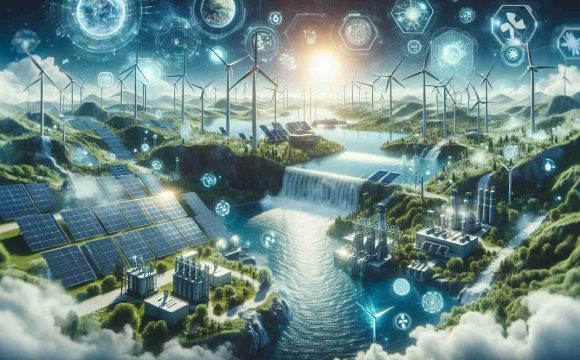Understanding the Future of Energy
As we approach 2025, the landscape of energy is set to transform dramatically. The urgency for sustainable energy practices is escalating due to environmental challenges, technological advancements, and global political shifts. Key trends are emerging that promise to reshape our approach to energy consumption and production.
Artificial Intelligence Revolutionizing Energy Management
Artificial intelligence is at the forefront of this transformation, enhancing energy management capabilities. AI is facilitating accurate energy demand forecasting and optimizing generation and distribution processes. Major corporations are already employing AI to streamline energy solutions, including enhancing the efficiency of electric vehicle charging and accelerating green initiatives.
Battery Technology Breakthroughs
Innovations in battery technology, especially solid-state and flow batteries, are making renewable energy storage more effective than ever. These advancements will enable a seamless integration of solar, wind, and tidal energy into existing grids, effectively addressing past limitations in energy generation reliability.
Decentralization of Energy Systems
The rising trend of decentralized energy production emphasizes the establishment of microgrids. By leveraging renewable resources at a local level, communities can enhance their energy resilience and decrease reliance on centralized power providers. This localized approach is expected to thrive in rural areas.
Global Geopolitical Influences
Political instability is pushing nations towards energy security, prompting a shift in how they source energy. Companies are prioritizing domestic energy production, navigating the complexities associated with foreign energy dependencies.
Promising Nuclear Alternatives
The introduction of small modular reactors signifies potential shifts in nuclear energy, offering a safer and more economical option for power generation. This could complement renewable sources in creating sustainable energy solutions.
Bridging the Energy Divide
Addressing global energy inequality remains crucial. Millions still lack reliable electricity, and finding affordable, clean energy solutions for underserved populations will be a pressing concern moving forward.
As we approach a pivotal moment in energy reform, understanding these trends will be essential for navigating the future landscape of power.
The Energy Revolution Awaits: What You Need to Know for 2025 and Beyond
Understanding the Future of Energy
As we edge closer to 2025, the energy landscape is projected to undergo significant transformation. The critical need for sustainable energy practices is fueled by pressing environmental challenges, rapid technological advancements, and shifting political dynamics globally. This article explores the emerging trends and innovations that are set to redefine our approach to energy consumption and production.
Key Innovations Shaping Energy Management
Artificial Intelligence Revolutionizing Energy Management
Artificial intelligence (AI) is spearheading a transformation in energy management. Companies are harnessing AI to predict energy demand with remarkable accuracy and streamline generation and distribution. For instance, AI algorithms analyze data from renewable sources to optimize energy flow, enhance grid reliability, and improve the efficiency of electric vehicle charging stations. This technology not only advances green initiatives but also aids in managing peak loads, reducing operational costs for energy providers.
Battery Technology Breakthroughs
Recent advancements in battery technology, particularly in solid-state and flow batteries, promise to revolutionize energy storage. These next-generation batteries offer higher efficiency and safety compared to traditional lithium-ion counterparts. They enable the reliable integration of renewable energy sources such as solar, wind, and tidal power into the grid. Furthermore, these innovations enhance energy storage capacity, ensuring a more consistent energy supply that addresses the intermittent nature of renewable resources.
Decentralization of Energy Systems
The trend toward decentralized energy production is reshaping how communities generate and consume energy. Microgrids—small-scale power grids that can operate independently—allow local resources to be harnessed effectively. This decentralization boosts energy resilience in areas prone to outages and reduces dependence on centralized energy providers. Particularly in rural and underserved regions, microgrids are becoming a viable solution for enhancing energy access and sustainability.
Navigating Global Geopolitics in Energy
Political instability and global conflicts are prompting nations to prioritize energy security, driving a paradigm shift in energy sourcing strategies. Countries are increasingly focusing on domestic energy production to minimize foreign reliance, often leading to increased investments in local renewable projects. This shift not only enhances energy independence but also promotes job creation and economic resilience within communities.
Exploring Promising Nuclear Alternatives
The advent of small modular reactors (SMRs) is opening new avenues in nuclear energy. These compact, efficient reactors present a safer and more flexible option for power generation, complementing renewable energy sources. SMRs are designed with advanced safety features and have a lower upfront cost compared to traditional nuclear plants, making them an attractive solution in the quest for sustainable energy.
Bridging the Energy Divide
Despite advancements in energy technologies, global energy inequality remains a pressing issue. Approximately 789 million people worldwide still lack access to reliable electricity. Addressing this divide through affordable, clean energy solutions is a crucial goal for the future. Innovative models, such as pay-as-you-go solar systems, are gaining traction in underserved markets, providing access to clean energy while empowering local communities.
Conclusion: Preparing for an Energy-Efficient Future
As the energy sector evolves rapidly, staying informed about these trends will be vital for businesses, policymakers, and individuals alike. By embracing innovations in AI, battery technology, decentralized systems, and new nuclear solutions, we stand on the brink of a transformative era in energy management.
For further exploration into the energy landscape, visit Energy.gov for insights on policies, technology advancements, and sustainability practices driving the future of energy.







